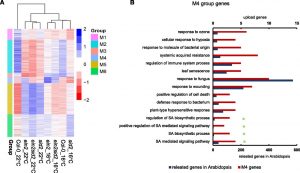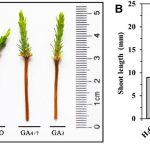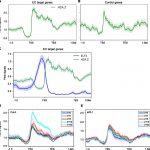Low Temperature Enhances Plant Immunity
Ambient temperature within the normal range of plant growth influences both pathogen virulence and host immune response. Plants rely on multilayered and multibranched immune systems to fight off pathogens. Plant immune responses are regulated by multiple plant hormones including salicylic acid (SA), jasmonic acid and ethylene. In Arabidopsis (Arabidopsis thaliana), the induction of SA biosynthesis by pathogens occurs predominantly through the isochorismate pathway, which contributes to 90% of the SA content. Li et al. (10.1104/pp.19.01130) now report that moderately low temperature enhances immunity to the bacterial pathogen Pseudomonas syringae in Arabidopsis (Arabidopsis thaliana). This enhancement is dependent on SA signaling and is accompanied by up-regulation of multiple SA biosynthesis and signaling genes at lower temperature. SA signaling is repressed by jasmonic acid and ethylene at both normal and low temperatures. The inhibition of SA biosynthesis by ethylene at low versus normal temperatures occurs by two distinct methods involving different enzymes. The repression by ethylene is mediated by a direct regulation of the ethylene response transcription factor ETHYLENE INSENSITIVE3 (EIN3) on multiple SA biosynthesis and signaling genes. Therefore, low temperature potentiates a higher number of SA biosynthesis genes for higher disease resistance, which is balanced by direct repression via the EIN3 transcription factor.
multilayered and multibranched immune systems to fight off pathogens. Plant immune responses are regulated by multiple plant hormones including salicylic acid (SA), jasmonic acid and ethylene. In Arabidopsis (Arabidopsis thaliana), the induction of SA biosynthesis by pathogens occurs predominantly through the isochorismate pathway, which contributes to 90% of the SA content. Li et al. (10.1104/pp.19.01130) now report that moderately low temperature enhances immunity to the bacterial pathogen Pseudomonas syringae in Arabidopsis (Arabidopsis thaliana). This enhancement is dependent on SA signaling and is accompanied by up-regulation of multiple SA biosynthesis and signaling genes at lower temperature. SA signaling is repressed by jasmonic acid and ethylene at both normal and low temperatures. The inhibition of SA biosynthesis by ethylene at low versus normal temperatures occurs by two distinct methods involving different enzymes. The repression by ethylene is mediated by a direct regulation of the ethylene response transcription factor ETHYLENE INSENSITIVE3 (EIN3) on multiple SA biosynthesis and signaling genes. Therefore, low temperature potentiates a higher number of SA biosynthesis genes for higher disease resistance, which is balanced by direct repression via the EIN3 transcription factor.



